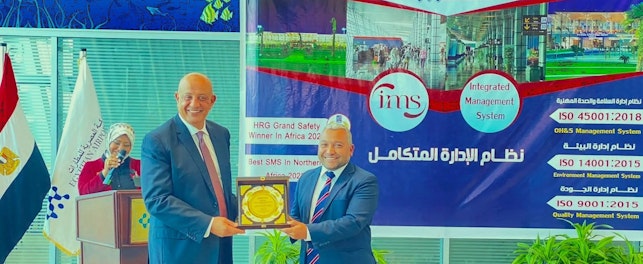Water is a critical resource in the Middle East, a region known for its arid climate and scarce water resources. Managing water effectively is crucial for sustaining ecosystems, supporting economic activities, and ensuring the well-being of communities.
The new ISO 14002-2:2023 standard provides organizations with specific guidelines on using the ISO 14001 framework to address water-related environmental aspects and conditions. This standard helps organizations integrate water management into their environmental management systems (EMS), ensuring sustainable use and protection of water resources.
Interaction between ISO 14001 & ISO 14002 series

Key: Environmental Management System (EMS)
Many organizations apply the general ISO 14001 framework to manage their interactions with the environment. ISO 14002-2, on the other side, provides guidance and examples focused on applying the ISO 14001 framework to address water-related environmental aspects and impacts, as well as water-related environmental conditions and dependencies on water that can have an effect on the organization.
It supports organizations to plan action(s) in relation to environmental impacts, and to water dependencies and vulnerabilities at their site(s), in the watershed, and in the life cycle of their products and services.
This includes strategic planning and taking actions in relation to:
- protecting aquatic ecosystems and ecosystem services as well as related ecosystems contributing to water balance;
- protecting water supplies and ensuring water availability;
- minimizing the use of water and water consumption;
- protecting and enhancing water quality;
- adapting and responding to water-related environmental conditions, such as seawater rise, changing precipitation patterns, or gradual changes in water availability and quality;
- preparing for foreseeable water-related events, such as flooding and droughts.
Why Do We Need ISO Standards for Water?
Water is one of the world’s most essential and precious commodities. It is fundamental to a sustainable future, playing a vital role in renewable energy, food production, and improving sanitation and health.
Globally, over 80% of wastewater generated by society flows back into the ecosystem untreated, and around 40% of the world’s population faces water scarcity. Pollution exacerbates these challenges, making effective water management a necessity.
In the Middle East, these issues are particularly acute. Rapid population growth, urbanization, and industrial expansion increase demand for water, while climate change impacts, such as reduced rainfall and increased temperatures, exacerbate water scarcity.
ISO 14002-2:2023 offers a structured approach to address these challenges by guiding organizations on sustainable water management practices.
Who Benefits from ISO Standards for Water?
Different Businesses and Industries
ISO standards for water help businesses optimize water use, treat and reuse wastewater, and implement best practices for water services. In industries such as agriculture, manufacturing, and construction, these standards provide tools to measure and improve water efficiency.
Governments and Regulators
Regulators can use ISO standards as a foundation for public policies addressing water-related challenges, such as climate change impacts and sanitation. This helps countries meet their national and international water management commitments.
Consumers
Consumers benefit from improved water quality and supply services when businesses and authorities implement ISO standards. This leads to better drinking water, sanitation, and water use in food production and agriculture.
Benefits of Applying ISO 14002-2:2023
Implementing ISO 14002-2:2023 offers numerous benefits, including:
- Compliance: Supports fulfillment of compliance obligations related to water withdrawal, consumption, and quality.
- Environmental Performance: Enhances environmental performance by managing water-related environmental aspects and achieving environmental objectives.
- Ecosystem Protection: Protects aquatic ecosystems and related ecosystems, such as forests, contributing to water balance.
- Risk Management: Miti gates water-related business risks and leverages opportunities in response to changing environmental conditions.
- Strategic Alignment: Aligns the environmental management system with the organization’s strategic direction and commitments related to sustainable water use.
- Cost Savings: Reduces costs through efficient water use and management practices.
- SDG Support: Contributes to achieving Sustainable Development Goal #6s (SDGs) related to water.
SGS Solutions for ISO 14002-2:2023
SGS offers a range of solutions to help organizations implement ISO 14002-2:2023:
- Non-Accredited Certification: ISO 14002-2:2023 certification services.
- Training: Provision of ISO 14001-2 related training to build competency in water management.
- Accredited Certification: ISO 14001:2015 EMS accredited certification.
- Auditor Training: ISO 14001 Lead Auditor and internal auditor training.
Reach out to know more about SGS solutions.
Conclusion
ISO 14002-2:2023 provides a structured approach for organizations to address water-related environmental aspects and conditions. By implementing this standard, organizations in the Middle East can enhance their environmental performance, protect vital water resources, and support sustainable development.
SGS offers comprehensive solutions to help organizations navigate this process, ensuring effective water management and compliance with international standards.
FAQ: ISO 14002-2:2023 EMS in the Middle East
Regulators: Develop robust water management policies.
Consumers: Better water quality and supply services.
About SGS
We are SGS – the world’s leading testing, inspection and certification company. We are recognized as the global benchmark for sustainability, quality and integrity. Our 99,600 employees operate a network of 2,600 offices and laboratories around the world.
9G Ahmed Kamel St. (Off Al Lasilki),
New Maadi, Cairo Governorate, 11728,
Cairo, Egypt




